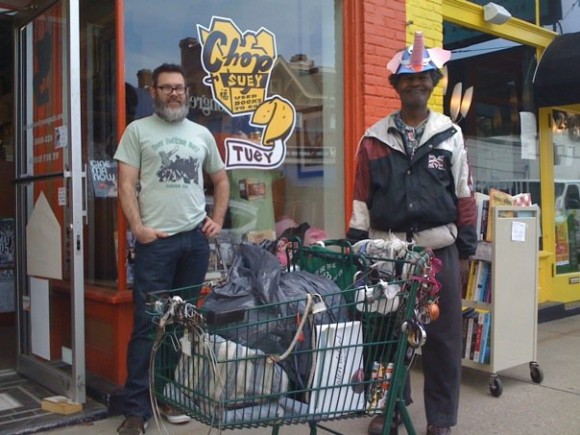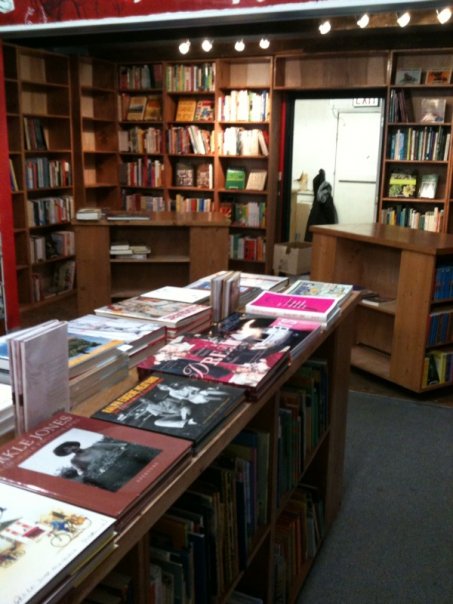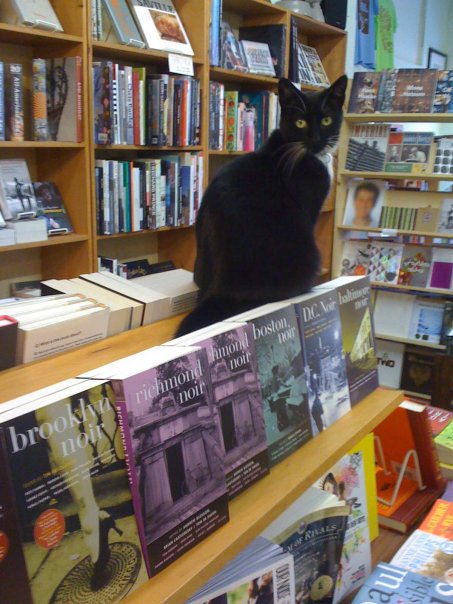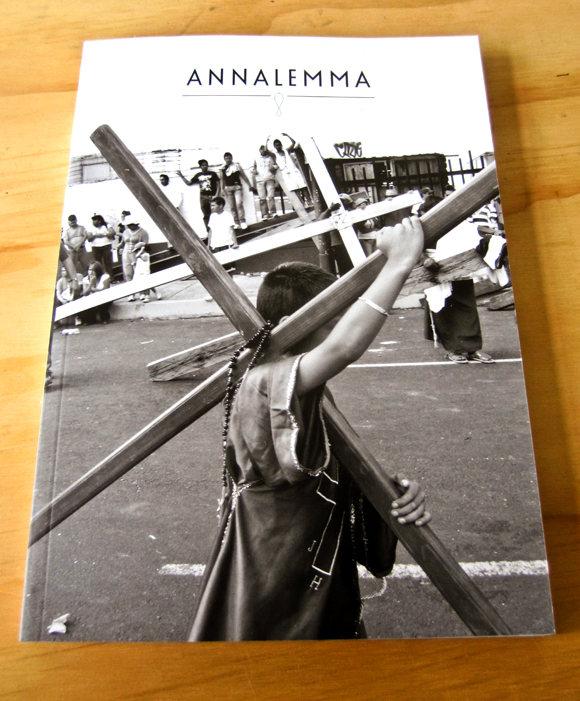Chop Suey Books owner and proprietor Ward Tefft is many things: cat owner, ordained minister, severely bearded. But first and foremost he is a bookseller. Chop Suey is the only bookstore worth going to next time you find yourself in Richmond, VA. Let Ward tell you why…
1. What’s Chop Suey’s origin story?
The store opened in March of 2002. We chose the name because the original building was an old Chop Suey restaurant, and the rusty sign was still hanging out front. I had spent about 8 years working in bookstores in NYC and in Buffalo, but wasn’t sure what to expect from Richmond. However, it quickly became apparent that Richmond was really happy to have a used book store that sold inexpensive literary and art books. Even though it was still pretty hand to mouth for the first few years, I decided to open a second location in Carytown in 2006. That move proved to be a great thing for us, as our original landlord jacked our rent by over 20% in 2008, after 7 years of us paying on time every month. It so happened that our Carytown landlord was able to lease us the upstairs right at the point, so we consolodated into one store. We’re now exclusively in Carytown and love it.
2. What’s the curatorial process when choosing books to stock?
We go with what we think is interesting. Of course, there are some books here that we stock because they are popular and in demand, but we really try to tailor the selection after our own taste.
3.What’s the arts/literature scene like in Richmond? What’s Chop Suey’s role in the lit/arts community?
With both the VCU MFA program and U of R’s great writing/literature department, Richmond has a great literary scene. Similarly, the visual art community is very strong. We have a joint relation with both, offering monthly art shows and dozens of readings throughout the year.
4. What helps books sell? What are the more successful books at Chop Suey?
A lot of things help. If there is a buzz around a book, it isn’t to hard to sell it. We have a lot of “face out” books on display, and we usually either choose the titles that are going to grab people’s attention (David Sedaris, Cormac McCarthy, etc) or ones that we feel are underappreciated and need to get some face time. We also try to have a working knowledge of what is a good read in all of the sections, even if we haven’t read it. That way, if someone is looking for a recommendation, we can tailor it to what kind of books they have liked in the past. And then there are the books that we force on customers who we know because we know their tastes and know they will love it. An example of this is the book Saguaro by Carson Mell. Carson is an animator whose work we found through Wholphin (McSweeney’s quarterly DVD) and then through his website. We all really liked his short films, and jumped at the chance to buy his self published book Saguaro.
I think we got 5 copies originally, and those were gone in a week because it turned out to be a great book. Since that time, word has spread and we’ve sold over 60. This is pretty cool considering that we are the only bookstore besides one in Carson’s LA neighborhood that sells it, and that it is the only new self-published book that we have in stock. If you haven’t read it, do so now. We ship!
5. How does a brick-and-mortar store not only survive, but maintain relevance in the age of Amazon?
One way is that we are always buying inventory, and we try to keep our store well stocked so that our customers can feel that there is a good chance that we will have a book that they are looking for. That is one of the great things about Amazon; the ability to get your hands on the exact book you are looking for immediately, and that is difficult to compete with for any store. We just keep our heads down and try our best.
But we have a saying here, and one day I’ll finally get the bumper stickers made for it: You might not find the book you want, but you’ll find the book you need. I truly believe that. That’s the old style of shopping at a used bookstore. Before the internet, you would go into a used book store hoping to find a specific book, but the number of quality books that you had never heard of would be way to intriguing to ignore. That is how I found some of my favorite books. Yes, internet sites can offer you everything you want. But smaller shops that are run correctly wouldn’t want to even compete with that. We are curators, and have selected a very specific inventory that gives us a credibility that a one-stop-shop won’t ever have. This is also what makes us, and every other small used bookstore, completely original. We have created an environment and experience at Chop Suey Books that is like no other place. That is our relevance.
6. Please describe the bookstore mascot.
WonTon is our store cat and mascot. He started coming to our original location in the Summer of 2008. Basically, he would walk through the open back door sometime in the morning, hang out with us all day, eat a little, and then disappear by closing time. This happened for about 3 weeks before we decided that he had chosen us as a store. We outfitted him with a collar so that if he was out at night and anything happened to him, someone could let us know. The very next day, a young girl who lived down the street came into the store to see if she could hang up a “lost cat” flier. Before asking, she kind of looked around the store as if looking for a cat. Then she handed us the flier, which, it turned out, was the only flier she had. On it was a picture of WonTon with the plea “Lloyd is missing. Please help!!!” We told her that WonTon, or, rather, Lloyd had spent every day of the last week with us. “Oh, well he has spent every night with me!” So, the mystery of what he did after 5 pm was answered!
It so happens that this girl, who worked at the SPCA, had adopted WonTon and his sister a couple of months back, but he and the sister weren’t getting along so the girl let him out during the day to give them space. Then, one night, her cat comes home with a tag proclaiming a different name and owner. Instead of just telling us, she concocted the scheme of “The Missing Cat.” It was a funny way for her to deal with it, but it was obviously her cat, so we returned him.
However, the next morning, WonTon showed up promptly for his morning shift, and did the same over the next 5 days. I had the girl’s phone number, so I called her and told her that WonTon obviously wanted to be at the store, and offered that we co-parent. This was fine with her, and by the time the store closed at the end of the Summer, he had chosen us as full time family. With the girl’s consent, WonTon was moved to Carytown, where he has become the mayor of our block.
























I love this new segment. Keep up the good work!
Thanks, Ryan. Glad you like. We’ve got some interviews coming up that highlight some righteous bookstores across the country. If you know of any cool ones shout them out.
Nice review and love the pic of WonTon on the shelf…face out.
Pilot Books in Seattle, WA. They specialize in indie presses.
http://www.pilotbooksseattle.com/wordpress/
Yes, Pilot is a place of gorgeousness. Summer is on the docket for an interview. Keep your eyes peeled.
Yeah, this segment is great. This particular one fills me with bookstore lust. Ward isolates here the two things that have separated the indie shops I love and the ones I go to out of desperation–updated inventory and the likelihood of the shelves to pleasantly surprise you.
Who is the other guy in the picture?
Tim: Yeah, I’ve been getting in touch with a lot of stores lately and it seems the most interesting (and successful) stores are ones that separate themselves from the herd, provide something interesting and different.
Henry: story on the other guy here – http://www.facebook.com/home.php?#!/photo.php?pid=5581348&id=228257341286&ref=fbx_album